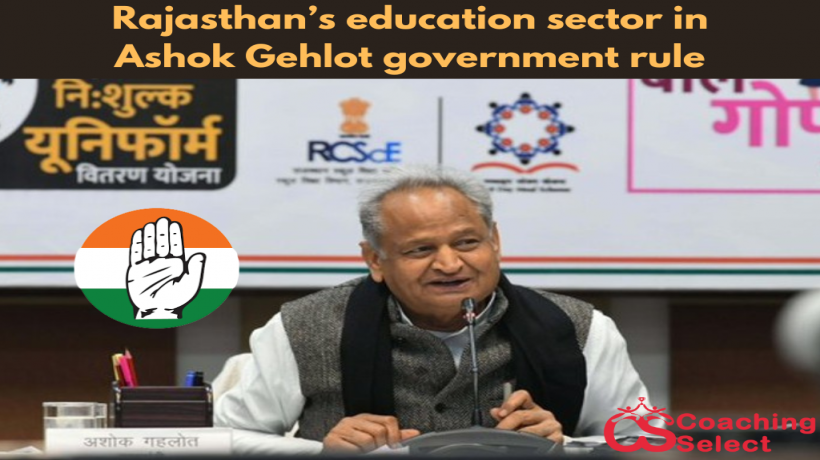Impact on Education in Rajasthan under Ashok Gehlot government tenure
Let's see how the Education Sector has changed in Rajasthan during the past Ashok Gehlot Government rule in the state.
October 28, 2023
Career Expert & Blogger

“Education is the most powerful weapon which you can use to change the world.” —Nelson Mandela. The role of education in our life is humongous and plays a pivotal role in our day-to-day life. If you are a resident of Rajasthan, think about the future generation of students when you cast your vote in Rajasthan Assembly Election 2023.
Education can change people's lives and society at large. The previous five years' progress demonstrates what can be accomplished when it is given attention. Here are the impacts made by Congress government in Rajasthan.
- Changes in Education Sector
Being a model state for education in India, you have undoubtedly heard a lot of talk lately concerning the quality of education in the Rajasthan. It is well known for its top results in competitive exams like NEET, IIT-JEE for many decades. In an attempt to provide students greater chances, the Congress party administration has made several significant adjustments. Let's quickly assess the current situation.
Girl Education
Girls are now eligible for free public education up to the university level, and this policy appears to be having a significant impact. There are more girls going to school and finishing it. To reduce the distance that children must travel, new schools have also opened in remote locations.
Improved Technology
Rajasthan now boasts more modern educational technology, including science lab supplies, projectors, and computers. Students can pick up practical skills that will help them in the current workforce.
University Level
The administration has started several programs to improve access to and the caliber of education offered throughout the state throughout the Congress party's tenure in power. However, In 2022–2023 Rajasthan saw the lowest growth in the gross enrolment ratio (GER) in higher education ever, rising to 0.14%. This phenomena has confounded analysts and called into doubt the Ashok Gehlot government's assertions that the state is becoming a national powerhouse for education. Government was in headlines of newspapers for ban on Student Union Elections in University from August 2023.
Extended Programme for Mid-Day Meals
In an effort to retain more children in school, the mid-day meal programme was expanded in 2018 to include free meals for students up to the eighth grade. With the addition of extra fruits, eggs, and milk to the menu, the meals are now also more nutrient-dense.
New Schools and Upgrades
Over 1,000 new schools have been built and thousands more classrooms added in the last 5 years. Existing schools are also being upgraded with new facilities like computer labs, libraries and playgrounds. This is giving more students the opportunity to learn in a proper environment.
Teacher Training. Teachers play such an important role, so the government is investing heavily in training programs to help educators improve their skills. Nearly 150,000 teachers have received additional training in the last few years. Better trained teachers mean students get a higher quality education.
Additional Academic Activities
Academic concentration alone is insufficient. It has been suggested that educational institutions give students the chance to engage in extracurricular activities such as athletics, the arts, volunteer work, and other pursuits. There are now new music and art facilities, playgrounds, and community service initiatives available. There are now many clubs and societies available for students to join.
Financial Aid and Support
All students should have access to education, regardless of their financial situation, according to government policy. For students from underprivileged neighbourhoods, new stipends, food plans, fee exemptions, and scholarships have been implemented. Extra rewards and privileges are given to girls and boys with impairments.
Literacy Rate
The Congress government has made good progress in improving literacy rates and access to education in Rajasthan over its current term. Since coming into power, the government has implemented several initiatives and reforms to strengthen the education system in the state. When the Congress took over, Rajasthan's literacy rate was around 67%. Today, the literacy rate stands at nearly 76% according to the latest census. This increase is thanks to programs like the Right to Education Act which made elementary education free and compulsory for children between 6 to 14 years old. The government also launched adult literacy programs, especially for women, to improve literacy in rural and marginalized communities.
- Challenges and Gaps That Remain
While the Congress government has made notable improvements to Rajasthan's education system over the last 5 years, several challenges and gaps still remain.
Lack of Qualified Teachers
Rajasthan faces an acute shortage of qualified teachers, especially in rural and remote areas. Nearly 25% of teaching positions in government schools are vacant. The student- teacher ratio remains high at 27:1, above the RTE recommendation of 30:1. The government has aimed to recruit more teachers, however, attracting and retaining quality educators, particularly women, has been difficult. Government counducted REET Exam but due to paper leak, REET vacancy took more than 2 years to complete. A large population of youth in state in facing unemployment crisis due to lack of job vacancies.
Inadequate Infrastructure
Many government schools lack basic infrastructure like classrooms, toilets, and playgrounds. Overcrowding is common, with some schools operating double or triple shifts to accommodate all students. Libraries, science labs and computer facilities are lacking in the majority of schools. While new schools have been built in some areas, maintenance of existing infrastructure remains an issue.
High Dropout Rates
Despite gains in enrollment, dropout rates after elementary school remain high in Rajasthan at over 50% for girls. Reasons include poverty, early marriage, lack of secondary schools, and poor quality of education. The Mid-Day Meal scheme and provision of free textbooks have encouraged more students to enroll in and attend school. However, more needs to be done to incentivize children to continue their education into secondary school and beyond.
Conclusion
Well, there you have it. The Congress government in Rajasthan has made significant progress in improving access to education over the past 5 years. From building new schools to hiring more teachers to launching programs for girls and disadvantaged students, education seems to actually be a priority. But there's still a long way to go to raise literacy rates and education standards across the state.



